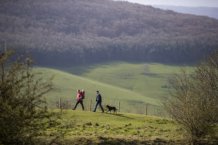
Visitors on a spring walk at Haresfield Beacon and Standish Wood, Gloucestershire. Credit: National Trust Images/Chris Lacey
A new, national partnership between the University of Exeter and the National Trust will see the two organisations join forces to help protect the natural world.
The joint research initiative will explore how both organisations can best respond and adapt to environmental and cultural change, support wildlife renewal and improve wellbeing through nature.
Experts will develop science-based, action-orientated research to inform land use decision making and better understand ways to care for our natural and cultural landscapes. The focus will be to plan and manage the inevitable transformation of landscapes so they work best for people, place, nature and future generations.
There will be new collaborations on projects involving landscapes and communities, and new opportunities for cross-disciplinary research, knowledge exchange and engagement at an international level.
This is only the second university collaboration of its kind from the National Trust. It builds on more than 20 joint research projects and four student placements run collaboratively by the University of Exeter and the National Trust over the last 5 years.
Professor Rosie Hails, Nature and Science Director, the National Trust, said: "We are delighted to be launching a new, national partnership with the University of Exeter which will build on our successful collaboration to date, support us to develop our research capability, and help us to address the challenges we face in caring for nature and culture through high-quality research.
"Lockdown has shown the value of our natural spaces for people, this partnership will help shape how we look after the natural and cultural heritage of our countryside and coastlines to make sure that nature, beauty and history are for everyone."
The collaboration will focus on three main themes: rethinking: how to reverse declines in nature and adapt to climate change;regeneration: managing changing multifunctional landscapes and exploring novel approaches and management techniques; and reconnection: engaging people in conservation.
Professor Lisa Roberts, Vice-Chancellor for the University of Exeter, said: "Solving national and global challenges is only possible through strong partnership working and I am delighted that we are now formalising our long-term partnership with the National Trust. This partnership will greatly enhance the research capability in both organisations and demonstrates our commitment to finding innovative solutions to protect and reconnect with our natural and cultural environments. I am very proud to be announcing the partnership at a time when finding solutions to protecting our natural environment could not be more important or relevant, and am equally excited by the innovative projects and activities the partnership offers to our staff and students. "
Sean Fielding, University of Exeter Director of Impact, Innovation and Business, said: "Together we hope to generate innovative new thinking to solve the huge challenges faced in conserving, protecting and engaging others in natural capital and landscape stewardship, cultural heritage, and ecological citizenship. We can engage experts from across the whole University including natural and social sciences, the arts and humanities to complement the National Trust's wealth of experience and skills."
Ongoing collaborative projects between the University of Exeter and National Trust include work led by Professor Caitlin DeSilvey to create a resource for heritage sites and policy makers to support heritage management in response to accelerating environmental change.






